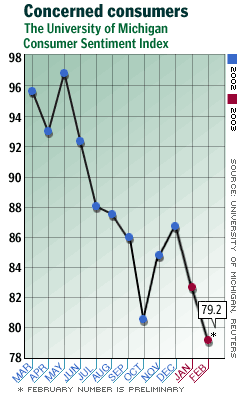NEW YORK (CNN/Money) - A closely watched measure of consumer confidence in the United States dropped to the lowest level in more than nine years in February, a new report said Friday, coming in worse than analysts expected.
The University of Michigan's consumer sentiment index fell to 79.2 from 82.4 in January, according to a Reuters report. Economists, on average, expected a reading of 81.9, according to Briefing.com.
It was the worst reading for the index since a 77.9 reading in September 1993. The index's current conditions component, measuring how consumers feel about the present state of the economy, fell to 95.3 from 97.2, according to Reuters.

More worrisome, however, was a drop in the expectations index, measuring how consumers feel about the future, to 68.8 from 72.8 in January.
"This shows the general level of apprehension gripping consumers now," said Kevin Logan, chief economist at Dresdner Kleinwort Wasserstein. "Though it's not a reliable guide to what consumers will do, it does hint that spending will grow at a slower pace."
The report had little impact on U.S. stock prices, which were higher in early trading. Treasury bond prices fell.
Traders were likely more interested in a report by United Nations weapons inspector Hans Blix about Iraq's cooperation (or lack thereof), as President Bush tries to build a case for going to war against Iraq if it does not cooperate.
Uncertainty about what might happen in Iraq has weighed on business confidence in recent months, many economists think, causing many corporate execs to delay spending or hiring plans.
Most economists think, once the Iraq crisis has passed, activity will pick up again, leading to a new round of hiring, which will increase consumer demand and trigger a virtuous cycle of economic growth.
Other economists, however, worry that, even after Iraq, businesses will still be busy cleaning up the excesses of the investment bubble of the late 1990s.
Whatever the cause, sluggish business activity has led to another "jobless recovery," similar to the one that followed the 1990-91 recession. Gross domestic product (GDP) is growing enough to fend off a recession, but not enough to create jobs.
A weak job market, combined with falling stocks, worries about Iraq and the possibility of future terror attacks, have conspired to undercut the confidence of U.S. consumers, whose spending makes up more than two-thirds of GDP.
Fortunately, consumers have at least kept spending, even as they have grown more worried. In fact, consumers almost never completely stop spending; the last time they did so was in the fourth quarter of 1991.
That reversal followed declines in spending in the fourth quarter of 1990 and the first quarter of 1991 -- and that weakness was tied, ironically enough, to concerns about Iraq.
Consumer spending bounced back following the easy U.S. victory in the Persian Gulf War, but fell back to earth again when companies continued to undo the excesses of the late 1980s by laying off workers.
If history repeats itself following the latest Persian Gulf crisis, with businesses staying on the sidelines post-Iraq as they repair balance sheets and keep costs low, leading to further weakness in the labor market, then consumer confidence and spending could be in for another rough patch.
"If there were a quick resolution to the Iraq confrontation, there would be brief euphoria, but we would come back to basics, which are that companies are not making enough money to meet profit expectations, their balance sheets have a lot of debt, and there's not a lot of room for expansion," Logan said.

|

